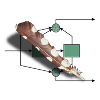 |
ccsoft
0.0.0
Convolutional codes library with soft decision decoding
|
 |
ccsoft
0.0.0
Convolutional codes library with soft decision decoding
|
The Stack Decoding class with node+edge combination This version uses fixed arrays to store registers and forward node+edges pointers. N_k template parameter gives the size of the input symbol (k parameter) and therefore the number of registers. There are (1<<N_k) forward node+edges. More...
#include <CC_StackDecoding_FA.h>
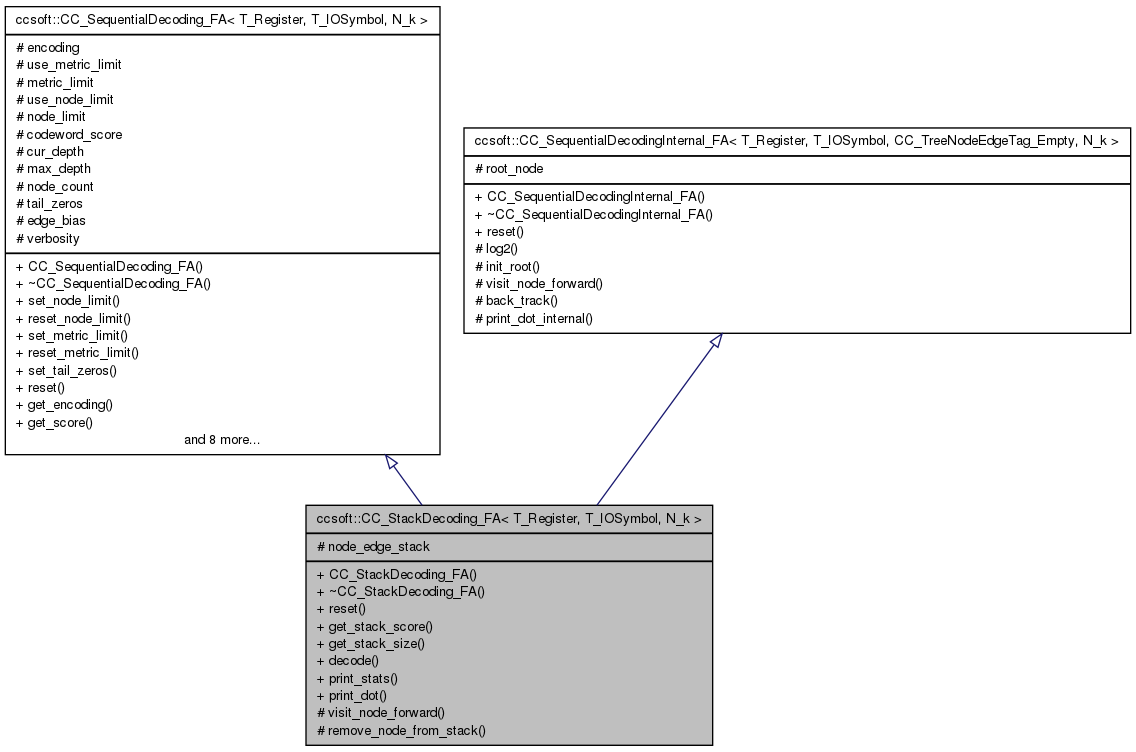
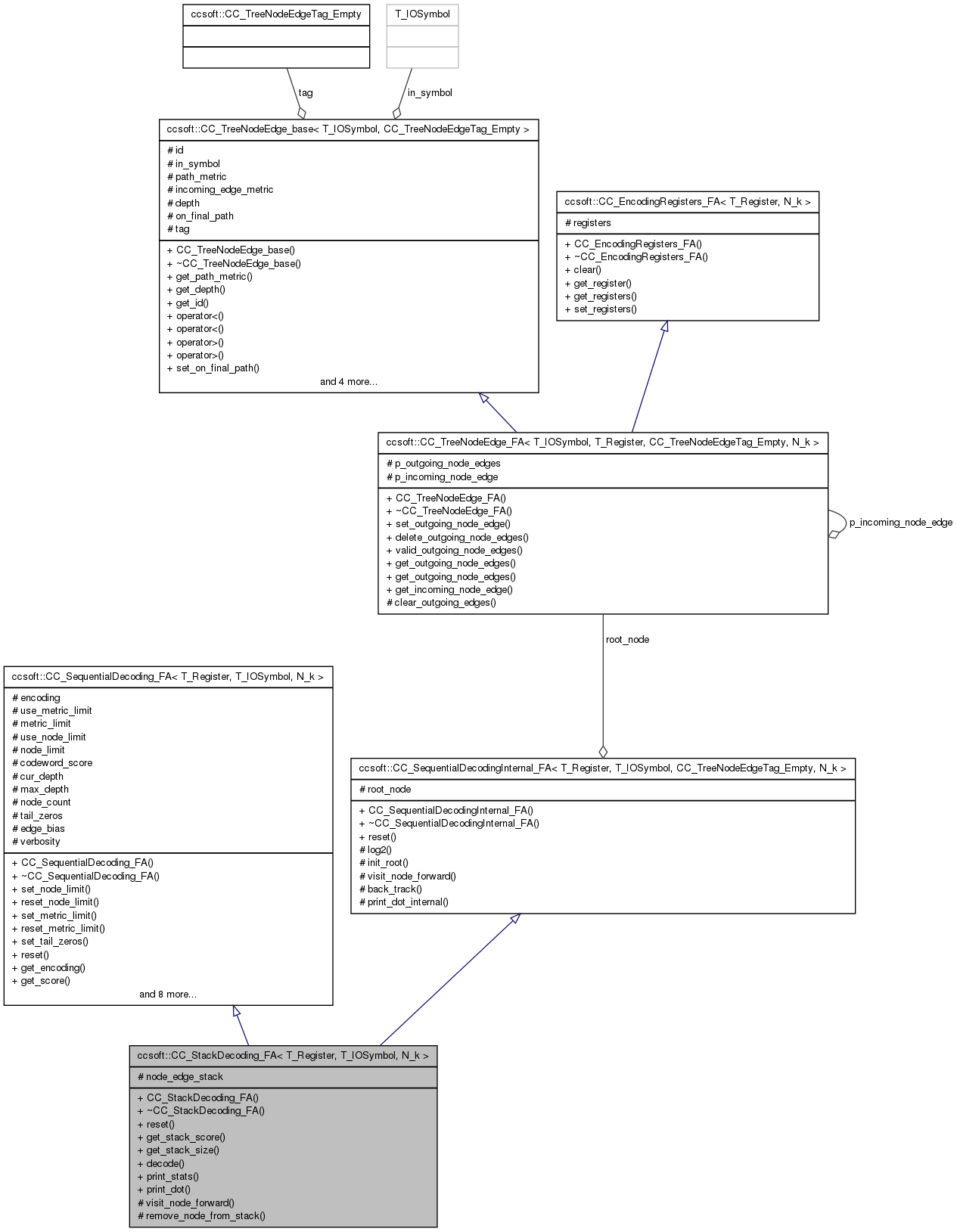
Public Member Functions | |
| CC_StackDecoding_FA (const std::vector< unsigned int > &constraints, const std::vector< std::vector< T_Register > > &genpoly_representations) | |
| virtual | ~CC_StackDecoding_FA () |
| void | reset () |
| float | get_stack_score () const |
| unsigned int | get_stack_size () const |
| virtual bool | decode (const CC_ReliabilityMatrix &relmat, std::vector< T_IOSymbol > &decoded_message) |
| virtual void | print_stats (std::ostream &os, bool success) |
| virtual void | print_dot (std::ostream &os) |
Protected Types | |
| typedef CC_SequentialDecoding_FA < T_Register, T_IOSymbol, N_k > | Parent |
| Parent class this class inherits from. | |
| typedef CC_SequentialDecodingInternal_FA < T_Register, T_IOSymbol, CC_TreeNodeEdgeTag_Empty, N_k > | ParentInternal |
| Parent class this class inherits from. | |
| typedef CC_TreeNodeEdge_FA < T_IOSymbol, T_Register, CC_TreeNodeEdgeTag_Empty, N_k > | StackNodeEdge |
| Class of code tree nodes in the stack algorithm. | |
Protected Member Functions | |
| virtual void | visit_node_forward (CC_TreeNodeEdge_FA< T_IOSymbol, T_Register, CC_TreeNodeEdgeTag_Empty, N_k > *node_edge, const CC_ReliabilityMatrix &relmat) |
| void | remove_node_from_stack (StackNodeEdge *node_edge) |
Protected Attributes | |
| std::map< NodeEdgeOrdering, StackNodeEdge *, std::greater < NodeEdgeOrdering > > | node_edge_stack |
| Ordered stack of node+edge combos by decreasing path metric. | |
The Stack Decoding class with node+edge combination This version uses fixed arrays to store registers and forward node+edges pointers. N_k template parameter gives the size of the input symbol (k parameter) and therefore the number of registers. There are (1<<N_k) forward node+edges.
| T_Register | Type of the encoder internal registers |
| T_IOSymbol | Type of the input and output symbols |
| N_k | Input symbol size in bits (k parameter) |
| N_k | Size of an input symbol in bits (k parameter) |
typedef CC_SequentialDecoding_FA<T_Register, T_IOSymbol, N_k> ccsoft::CC_StackDecoding_FA< T_Register, T_IOSymbol, N_k >::Parent [protected] |
Parent class this class inherits from.
typedef CC_SequentialDecodingInternal_FA<T_Register, T_IOSymbol, CC_TreeNodeEdgeTag_Empty, N_k> ccsoft::CC_StackDecoding_FA< T_Register, T_IOSymbol, N_k >::ParentInternal [protected] |
Parent class this class inherits from.
typedef CC_TreeNodeEdge_FA<T_IOSymbol, T_Register, CC_TreeNodeEdgeTag_Empty, N_k> ccsoft::CC_StackDecoding_FA< T_Register, T_IOSymbol, N_k >::StackNodeEdge [protected] |
Class of code tree nodes in the stack algorithm.
| ccsoft::CC_StackDecoding_FA< T_Register, T_IOSymbol, N_k >::CC_StackDecoding_FA | ( | const std::vector< unsigned int > & | constraints, |
| const std::vector< std::vector< T_Register > > & | genpoly_representations | ||
| ) | [inline] |
Constructor
| constraints | Vector of register lengths (constraint length + 1). The number of elements determines k. |
| genpoly_representations | Generator polynomial numeric representations. There are as many elements as there are input bits (k). Each element is itself a vector with one polynomial value per output bit. The smallest size of these vectors is retained as the number of output bits n. The input bits of a symbol are clocked simultaneously into the right hand side, or least significant position of the internal registers. Therefore the given polynomial representation of generators should follow the same convention. |
:
CC_SequentialDecoding_FA<T_Register, T_IOSymbol, N_k>(constraints, genpoly_representations),
CC_SequentialDecodingInternal_FA<T_Register, T_IOSymbol, CC_TreeNodeEdgeTag_Empty, N_k>()
{}
| virtual ccsoft::CC_StackDecoding_FA< T_Register, T_IOSymbol, N_k >::~CC_StackDecoding_FA | ( | ) | [inline, virtual] |
Destructor. Does a final garbage collection
{}
| virtual bool ccsoft::CC_StackDecoding_FA< T_Register, T_IOSymbol, N_k >::decode | ( | const CC_ReliabilityMatrix & | relmat, |
| std::vector< T_IOSymbol > & | decoded_message | ||
| ) | [inline, virtual] |
Decodes given the reliability matrix
| relmat | Reference to the reliability matrix |
| decoded_message | Vector of symbols of retrieved message |
Implements ccsoft::CC_SequentialDecoding_FA< T_Register, T_IOSymbol, N_k >.
{
if (relmat.get_message_length() < Parent::encoding.get_m())
{
throw CCSoft_Exception("Reliability Matrix should have a number of columns at least equal to the code constraint");
}
if (relmat.get_nb_symbols_log2() != Parent::encoding.get_n())
{
throw CCSoft_Exception("Reliability Matrix is not compatible with code output symbol size");
}
reset();
ParentInternal::init_root(); // initialize the root node
Parent::node_count++;
visit_node_forward(ParentInternal::root_node, relmat); // visit the root node
// loop until we get to a terminal node or the metric limit is encountered hence the stack is empty
while ((node_edge_stack.size() > 0)
&& (node_edge_stack.begin()->second->get_depth() < relmat.get_message_length() - 1))
{
StackNodeEdge* node = node_edge_stack.begin()->second;
//std::cout << std::dec << node->get_id() << ":" << node->get_depth() << ":" << node_stack.begin()->first.path_metric << std::endl;
visit_node_forward(node, relmat);
if ((Parent::use_node_limit) && (Parent::node_count > Parent::node_limit))
{
std::cerr << "Node limit exhausted" << std::endl;
return false;
}
}
// Top node has the solution if we have not given up
if (!Parent::use_metric_limit || node_edge_stack.size() != 0)
{
//std::cout << "final: " << std::dec << node_stack.begin()->second->get_id() << ":" << node_stack.begin()->second->get_depth() << ":" << node_stack.begin()->first.path_metric << std::endl;
ParentInternal::back_track(node_edge_stack.begin()->second, decoded_message, true); // back track from terminal node to retrieve decoded message
Parent::codeword_score = node_edge_stack.begin()->first.path_metric; // the codeword score is the path metric
return true;
}
else
{
std::cerr << "Metric limit encountered" << std::endl;
return false; // no solution
}
}

| float ccsoft::CC_StackDecoding_FA< T_Register, T_IOSymbol, N_k >::get_stack_score | ( | ) | const [inline] |
Get the score at the top of the stack. Valid anytime the process has started (stack not empty).
{
return node_edge_stack.begin()->first.path_metric;
}
| unsigned int ccsoft::CC_StackDecoding_FA< T_Register, T_IOSymbol, N_k >::get_stack_size | ( | ) | const [inline] |
Get the stack size
{
return node_edge_stack.size();
}
| virtual void ccsoft::CC_StackDecoding_FA< T_Register, T_IOSymbol, N_k >::print_dot | ( | std::ostream & | os | ) | [inline, virtual] |
Print the dot (Graphviz) file of the current decode tree to an output stream
| os | Output stream |
Implements ccsoft::CC_SequentialDecoding_FA< T_Register, T_IOSymbol, N_k >.
{
ParentInternal::print_dot_internal(os);
}

| virtual void ccsoft::CC_StackDecoding_FA< T_Register, T_IOSymbol, N_k >::print_stats | ( | std::ostream & | os, |
| bool | success | ||
| ) | [inline, virtual] |
Print stats to an output stream
| os | Output stream |
| success | True if decoding was successful |
Implements ccsoft::CC_SequentialDecoding_FA< T_Register, T_IOSymbol, N_k >.
{
std::cout << "score = " << Parent::get_score()
<< " stack_score = " << get_stack_score()
<< " #nodes = " << Parent::get_nb_nodes()
<< " stack_size = " << get_stack_size()
<< " max depth = " << Parent::get_max_depth() << std::endl;
std::cout << "_RES " << (success ? 1 : 0) << ","
<< Parent::get_score() << ","
<< get_stack_score() << ","
<< Parent::get_nb_nodes() << ","
<< get_stack_size() << ","
<< Parent::get_max_depth() << std::endl;
}
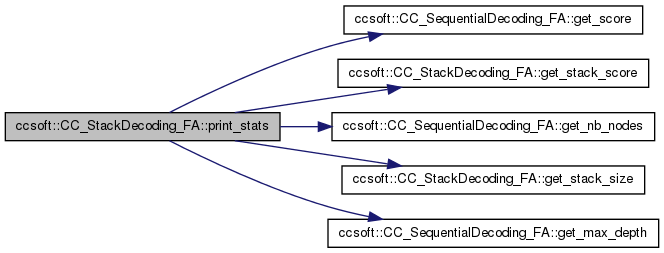
| void ccsoft::CC_StackDecoding_FA< T_Register, T_IOSymbol, N_k >::remove_node_from_stack | ( | StackNodeEdge * | node_edge | ) | [inline, protected] |
Removes a node from the stack map. Does a full scan but usually the nodes to be removed are on the top of the stack (i.e. beginning of the map).
{
typename std::map<NodeEdgeOrdering, StackNodeEdge*, std::greater<NodeEdgeOrdering> >::iterator stack_it = node_edge_stack.begin();
for (; stack_it != node_edge_stack.end(); ++stack_it)
{
if (node_edge == stack_it->second)
{
node_edge_stack.erase(stack_it);
break;
}
}
}
| void ccsoft::CC_StackDecoding_FA< T_Register, T_IOSymbol, N_k >::reset | ( | ) | [inline] |
Reset the decoding process
Reimplemented from ccsoft::CC_SequentialDecoding_FA< T_Register, T_IOSymbol, N_k >.
{
ParentInternal::reset();
Parent::reset();
node_edge_stack.clear();
}

| virtual void ccsoft::CC_StackDecoding_FA< T_Register, T_IOSymbol, N_k >::visit_node_forward | ( | CC_TreeNodeEdge_FA< T_IOSymbol, T_Register, CC_TreeNodeEdgeTag_Empty, N_k > * | node_edge, |
| const CC_ReliabilityMatrix & | relmat | ||
| ) | [inline, protected, virtual] |
Visit a new node Node+edge combo to visit Reliability matrix being used
Implements ccsoft::CC_SequentialDecodingInternal_FA< T_Register, T_IOSymbol, CC_TreeNodeEdgeTag_Empty, N_k >.
{
int forward_depth = node_edge->get_depth() + 1;
T_IOSymbol out_symbol;
T_IOSymbol end_symbol;
// return encoder to appropriate state
if (node_edge->get_depth() >= 0) // does not concern the root node
{
Parent::encoding.set_registers(node_edge->get_registers());
}
if ((Parent::tail_zeros) && (forward_depth > relmat.get_message_length()-Parent::encoding.get_m()))
{
end_symbol = 1; // if zero tail option assume tail symbols are all zeros
}
else
{
end_symbol = (1<<Parent::encoding.get_k()); // full scan all possible input symbols
}
// loop through assumption for this symbol place
for (T_IOSymbol in_symbol = 0; in_symbol < end_symbol; in_symbol++)
{
Parent::encoding.encode(in_symbol, out_symbol, in_symbol > 0); // step only for a new symbol place
float edge_metric = ParentInternal::log2(relmat(out_symbol, forward_depth)) - Parent::edge_bias;
float forward_path_metric = edge_metric + node_edge->get_path_metric();
if ((!Parent::use_metric_limit) || (forward_path_metric > Parent::metric_limit))
{
StackNodeEdge *next_node_edge = new StackNodeEdge(Parent::node_count, node_edge, in_symbol, edge_metric, forward_path_metric, forward_depth);
next_node_edge->set_registers(Parent::encoding.get_registers());
node_edge->set_outgoing_node_edge(next_node_edge, in_symbol); // add forward edge+node combo
node_edge_stack[NodeEdgeOrdering(forward_path_metric, Parent::node_count)] = next_node_edge;
//std::cout << "->" << std::dec << node_count << ":" << forward_depth << " (" << (unsigned int) in_symbol << "," << (unsigned int) out_symbol << "): " << forward_path_metric << std::endl;
Parent::node_count++;
}
}
Parent::cur_depth = forward_depth; // new encoder position
if (Parent::cur_depth > Parent::max_depth)
{
Parent::max_depth = Parent::cur_depth;
}
if (node_edge->get_depth() >= 0)
{
remove_node_from_stack(node_edge); // remove current node from the stack unless it is the root node which is not in the stack
}
}
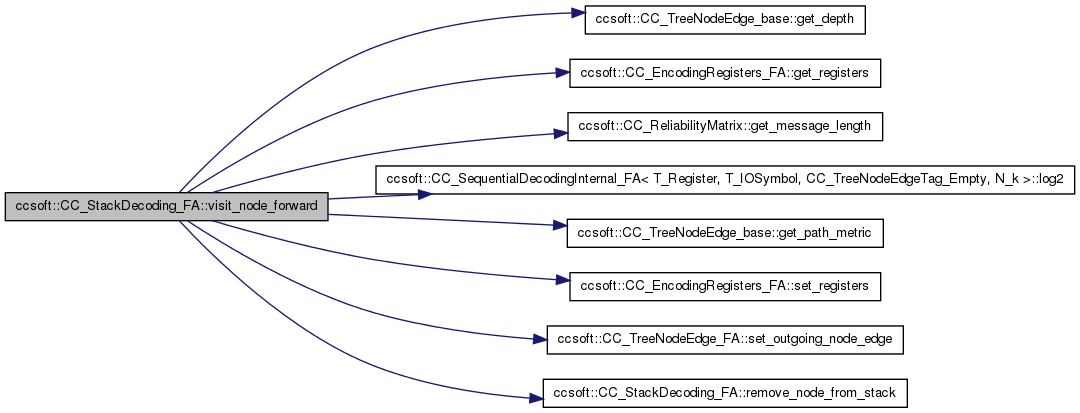
std::map<NodeEdgeOrdering, StackNodeEdge*, std::greater<NodeEdgeOrdering> > ccsoft::CC_StackDecoding_FA< T_Register, T_IOSymbol, N_k >::node_edge_stack [protected] |
Ordered stack of node+edge combos by decreasing path metric.